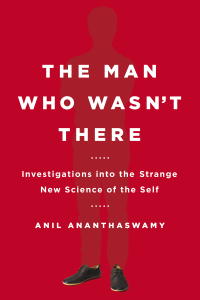Anil Ananthaswamy: The Man Who Wasn’t There
INVESTIGATIONS INTO THE
STRANGE NEW SCIENCE OF THE SELF
Anil Ananthaswamy
Dutton (Penguin Random House, USA), August 4, 2015, $26.95
ISBN: 9780525954194
Ananthaswamy writes:
I was wrapping up my last book, The Edge of Physics, when my then editor asked if I had any ideas for a new book. I said I wanted to write a book on the sense of self, but I didn’t have a novel way into the topic, just a range of rambling thoughts.
Over the course of the next couple of years, I realized I could write about the human self by studying what happens when our sense of self is compromised. I began by identifying conditions that are known to change our sense of self in some profound way, in how our body feels, for example, or when our narrative, autobiographic self is damaged, as happens in Alzheimer’s. The research resulted in a long-form feature for Matter magazine, on body integrity identity disorder, which perturbs one’s bodily self.
I wrote a book proposal on the strength of all this material. My agent sent it to various U.S. publishers. Dutton (Penguin Random House) made an offer for world English rights, which I accepted.The first third of the advance funded my research for the book, which involved traveling to meet scientists, philosophers, doctors, and people who were suffering from conditions such as Alzheimer’s, schizophrenia, and ecstatic epilepsy. I write regularly for New Scientist magazine, and teach an annual journalism workshop in Bangalore, India, so writing the book was a juggling act. Thankfully, I enjoy reporting and writing, so while it was hard work, it was also immensely satisfying.
Writing a book allows me to dig deep into one subject, more so than any amount of magazine writing will allow. I can also write in my natural style. The one thing I’d have done differently, or at least done more of, is that I would have read more about the philosophy of the self and consciousness. At some point I had to stop researching and start writing. The result is a book that examines the neuroscientific evidence for how the brain and body work together to create our sense of self.
Contact info:
- Anil Ananthaswamy, anil@nasw.org, www.anilananthaswamy.com
- Agent: Peter Tallack, The Science Factory, 49 40 4327 4959 (Germany), peter@sciencefactory.co.uk
- Publicist: Amanda Walker, 212-366-2212, amwalker@penguinrandomhouse.com
- Liza Cassity, 212-366-2554, lcassity@penguinrandomhouse.com
- Book website: http://www.anilananthaswamy.com/the-man-who-wasnt-there
- Blog website: http://www.anilananthaswamy.com/blog
NASW members: will your book be published soon? Take advantage of this opportunity for shameless self-promotion.
Tell your fellow NASW members how you came up with the idea for your book, developed a proposal, found an agent and publisher, funded and conducted research, and put the book together. Include what you wish you had known before you started this project, or had done differently.
See https://www.nasw.org/advance-copy-submission-guidelines.
Send info and images to Lynne Lamberg, NASW book editor, llamberg@nasw.org.




